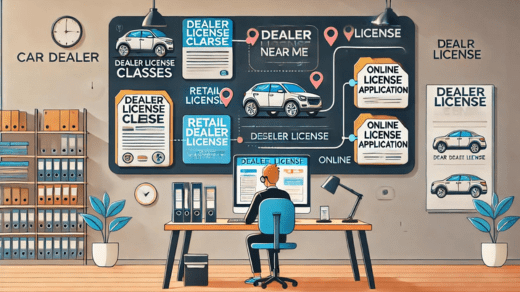If you’re considering a career in the automotive sales industry, obtaining a car dealer license is a crucial step. This license allows you to legally buy and sell vehicles, either as a new car dealership or as a used car lot. Here’s a detailed guide on how to get a car dealer license, including steps, requirements, and useful resources.
Understanding the Basics
Before diving into the specifics, it’s important to understand what a car dealer license is and why you need one. A car dealer license is a legal authorization that allows you to operate a business that sells vehicles. Without this license, engaging in buying and selling cars is illegal and can result in hefty fines and legal issues.
Steps to Get a Car Dealer License
- Research State Requirements The process to obtain a car dealer license varies by state, so the first step is to research the specific requirements in your area. Each state has its own set of rules and regulations regarding car dealership operations. Visit your state’s Department of Motor Vehicles (DMV) or equivalent authority for detailed information.
- Complete Pre-Licensing Education Many states require prospective car dealers to complete a pre-licensing education course. These courses cover essential topics such as dealership operations, legal obligations, and ethical practices. Look for dealer license classes near me to find local options or online courses that meet state requirements.
- Prepare Your Business Plan Having a solid business plan is essential. Your plan should include details about your business model, target market, and financial projections. This plan will be a crucial part of your application process and will demonstrate your preparedness to operate a dealership.
- Secure a Business Location You’ll need a physical location for your dealership. This location must meet state and local zoning requirements and should be equipped to display and sell vehicles. Ensure that your location complies with all relevant regulations to avoid delays in obtaining your license.
- Obtain Necessary Insurance Car dealerships are required to have certain types of insurance. Typically, this includes liability insurance and a bond. Insurance protects your business from potential claims, while the bond ensures that you comply with state regulations and fulfill your contractual obligations.
- Apply for the License Once you’ve met all the prerequisites, you can apply for your car dealer license. This application process usually involves submitting your business plan, proof of insurance, and other required documentation to your state’s licensing authority. Be prepared for a background check and possibly an inspection of your business location.
- Pay the Fees There are fees associated with applying for and maintaining a car dealer license. These fees vary by state and may include application fees, license fees, and renewal fees. Check with your local licensing authority for specific fee amounts.
- Attend a Dealer Training Course Some states mandate that you attend a dealer training course as part of the licensing process. These courses provide valuable information about dealership operations, compliance with state laws, and best practices in the industry.
- Pass the Exam Depending on your state, you may be required to pass an exam that tests your knowledge of dealership operations and state regulations. This exam ensures that you are well-informed about the responsibilities and legal requirements of operating a car dealership.
- Obtain a Retail Dealer License For those focusing on selling vehicles to the general public, obtaining a retail dealer license is essential. This license specifically allows you to engage in retail sales of vehicles, and it often requires additional documentation and compliance with specific regulations.
Additional Tips
- Check Local Regulations: Besides state requirements, you must also comply with local ordinances and regulations. Make sure your dealership adheres to all local zoning laws and business codes.
- Stay Informed: The automotive industry and dealership regulations can change frequently. Stay updated on any changes in laws or best practices by joining industry associations and attending relevant workshops.
- Consider Online Resources: For some aspects of the licensing process, such as education and application submission, you might find online resources helpful. Many states offer the option to get a dealers license online, which can streamline the process.
Conclusion
Obtaining a car dealer license is a multi-step process that requires careful planning and adherence to state and local regulations. By following the steps outlined above and utilizing resources such as dealer license classes near me and online application options, you can successfully navigate the licensing process and start your journey in the automotive sales industry.
If you’re looking for further assistance, consider reaching out to industry professionals or consulting firms that specialize in dealership licensing. Their expertise can provide valuable insights and support throughout your licensing journey.




